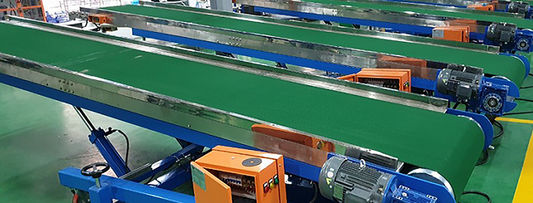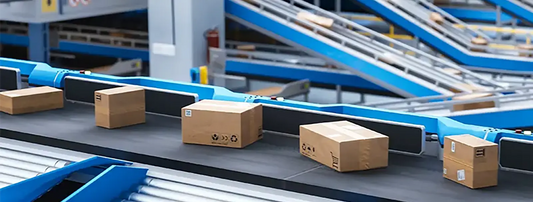Beyond FDA Approval: What Really Makes a Food Grade Conveyor Belt?
In food production, the conveyor belt is not just a moving surface. It is part of your food contact zone. An FDA-approved conveyor belt can still be your production line's biggest liability. We've seen belts that passed every compliance test yet became breeding grounds for bacteria, cost thousands in unscheduled downtime, or contaminated product because they were NOT RIGHT for the real-world environment. True food-grade performance isn't about a certificate; it's about how a belt withstands daily warfare against fats, acids, abrasion, and high-pressure washdowns.
If you want fewer risks and better uptime, focus on what truly makes a conveyor belt food grade. Look beyond the certification and judge how the belt behaves in real conditions.

The Five Pillars of a TRUE Food Grade Conveyor Belt
FDA compliance covers material safety. It tells you the belt uses components considered safe for direct food contact, with acceptable migration limits. That matters. But FDA approval does not tell you how the belt will behave after months of washdowns, temperature swings, or exposure to fats and acids, which in fact are vital factors for a food grade conveyor belt.
1. Hygiene and Cleanability
FDA compliance does not guarantee the belt cleans well. Cleanability impacts downtime, sanitation labor, and audit readiness.
What to Look For
| Feature | Why It Matters |
|---|---|
| Smooth, closed surface | Reduces residue buildup and speeds cleaning |
| No fabric exposure | Prevents moisture absorption and bacterial growth |
| Low porosity | Keeps oils, fats, sugars, and protein residues from embedding |
| Simple edges and splice design | Minimizes harborage points |
Quick Hygiene Checklist
- No texture that traps fine particles
- Belt surface rinses clean without heavy scrubbing
- No shadow zones beneath the splice
- Compatible with your cleaning chemicals
- Withstands high frequency washdowns
If a belt slows your team during cleaning, it costs you money every week.

2. Chemical and Temperature Resistance
Different food sectors expose belts to very different conditions, and different applications demand different belt chemistries and structures.
FDA approval aside, the right material depends on washdowns, oils, temperature swings, and the type of food being handled.
| Belt Type | Strengths | Weaknesses | Best Fit |
|---|---|---|---|
| TPU Belts | Excellent cut resistance, great chemical resistance, flexible in cold rooms, long lifespan | Higher cost than PVC | Meat, poultry, seafood, ready meals |
| PVC | Affordable, flexible, easy to install | Poor oil and fat resistance, hardens in cold, shorter lifespan | Bakery, produce, dry goods |
| Rubber | Strong grip, high abrasion resistance | Not ideal for heavy washdowns or direct food contact | Bulk handling, incline conveyors |
| Plastic Modular | Easy to repair, strong for heavy loads, good drainage, ideal for conveyors with curves | More labor to clean, multiple hinge points that can trap debris if not maintained well | Seafood, vegetable washing, deboning lines, high load or wet applications |
In meat and poultry plants, PVC often fails early. In bakeries, TPU may be overkill.
Plastic modular belts shine in environments where you need drainage for wash or rinse systems, however their hinges may trap protein or fat, and can create sanitation headaches.
3. Mechanical Integrity and Splice Strength
What a Strong Splice Should Offer
- Smooth transition across rollers
- No fibers exposed
- Full bond across the width
- No lifting or micro gaps
- Stable under washdowns and tension changes
A strong finger splice or a homogeneous belt with no fabric layer is ideal for heavy sanitation environments.
Read more on Conveyor Belt Splicing: Techniques, how-to and Best Practices

4. Operational Performance and Production Fit
This is where you choose the belt that fits your actual process. Different food categories need different features.
When a belt fits the application, you see fewer stoppages and fewer rejects.
| Application | Primary Challenges | Recommended Belt Type | Critical Feature |
|---|---|---|---|
| Meat & Poultry | Fats, proteins, blood, CIP chemicals | Reinforced TPU | Anti-microbial coating, high cut resistance, clean in place design |
| Bakery | Sugars, oils, flour dust, heat | Silicone-coated / Teflon | Non-stick surface, high-temperature stability |
| Dairy | Aggressive sanitizers, fats | Homogeneous TPU | High chemical resistance, smooth surface |
5. Maintainability and Total Cost of Ownership
A good belt does not need babysitting. Still, preventive maintenance matters more than many operators expect.
Preventive Maintenance Checklist
- Daily: check tracking, debris, surface condition
- Weekly: inspect splice edges, tension, roller wear
- Monthly: evaluate belt stretch and energy load
- Quarterly: document cleaning effectiveness and wear pattern
- Annually: assess whether the belt still meets hygiene and performance standards
TCO: Why the Cheap Belt Becomes Expensive
- More cleaning time
- More chemicals
- More water usage
- More tracking corrections
- More early replacements
- Higher contamination risk
- More unplanned downtime
A belt costs more or less based on how it behaves during cleaning, not on the invoice price. READ MORE
Conclusion
FDA approval is not a guarantee of performance. A conveyor belt becomes truly food grade when it is:
- easy to clean
- strong against chemicals
- consistent across washdowns and long shifts
- safe in its splice
- matched to your specific food process
- predictable under preventive maintenance
The belts that check all five pillars protect your product, your brand, and your uptime.
If you want help comparing conveyor belt options, improving sanitation time, or solving an ongoing tracking or splice issue, Kunming Conveyor Belt is always happy to review your line and give practical suggestions based on real plant experience.







